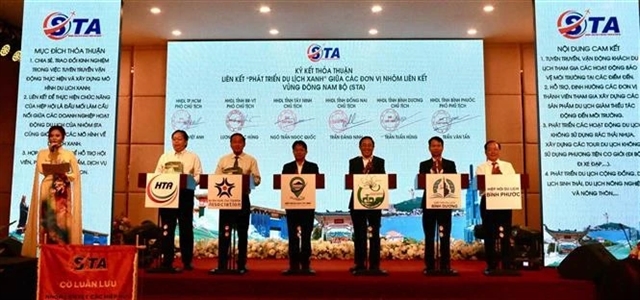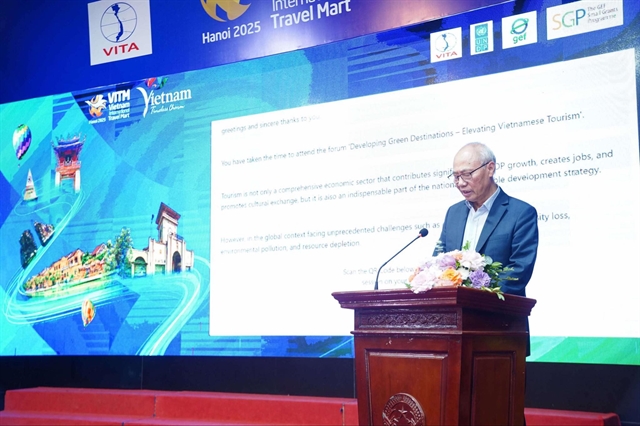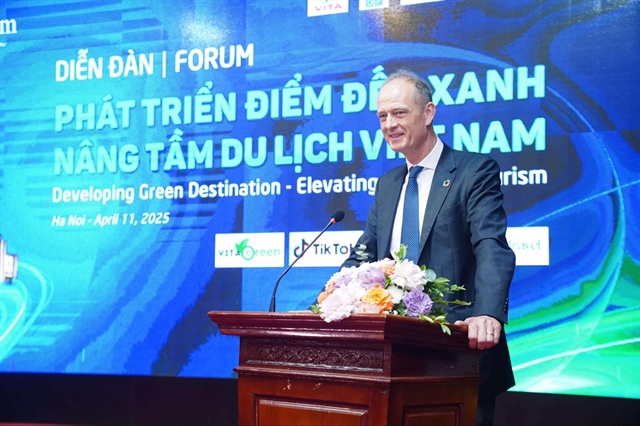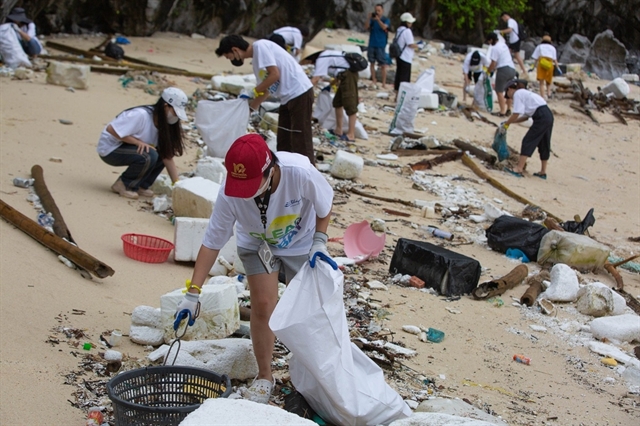 Life & Style
Life & Style

HÀ NỘI —Raising awareness and implementing green transition solutions are essential for Việt Nam's tourism industry to develop sustainably and responsibly, as highlighted during a workshop in Hà Nội.
 |
| Vũ Thế Bình, Chairman of the Vietnam Tourism Association delivers a speech at the forum. Photo vntravel.org.vn |
The forum, Developing Green Destinations – Elevating Vietnamese Tourism, organised by the Vietnam Tourism Association (VTA), was held as part of the Vietnam International Tourism Fair (VITM) Hanoi 2025. It gathered over 350 domestic and international delegates to discuss green tourism strategies.
Green transition: A mandatory path
At the event, Vũ Thế Bình, VTA Chairman, emphasised that tourism is a vital economic sector contributing to GDP, job creation, and cultural exchange, as well as being integral to Việt Nam’s sustainable development strategy.
However, global challenges such as climate change and resource depletion demand a transformation in tourism practices. Green transition is no longer optional but a requirement for the future.
To support this shift, the association introduced the Green Tourism Criteria (VITA GREEN), providing a practical tool for destinations and businesses to adopt sustainable practices.
Patrick Haverman, Deputy Resident Representative of UNDP Vietnam, underscored the importance of green transportation in building sustainable tourism.
 |
| Patrick Haverman, Deputy Resident Representative of UNDP Vietnam speaks at the forum. Photo vntravel.org.vn |
“We see tourism as a key driver for Sustainable Development Goals. In collaboration with partners like VITA and tourism companies, we've championed green destinations through the ‘Reduce plastic waste in tourism in Viet Nam’ project, supported by the UNDP/GEF Small Grants Programme.
This initiative has developed criteria for plastic-free tourism, introduced a waste management app, and established a nationwide action plan embraced by VITA.
Pilot projects in Ninh Bình and Quảng Nam achieved 40-55 per cent reductions in single-use plastics,” he said.
UNDP Vietnam emphasised their commitment to eco-friendly transport, noting the launch of electric vehicle charging stations in Phú Yên and Huế as part of their efforts to align with the country's net-zero emissions goals and foster a green tourism ecosystem.
Haverman remarked that elevating Vietnamese tourism through green destinations is both a necessity and an opportunity.
UNDP Vietnam is committed to partnering with the Ministry of Culture, Sports and Tourism, the VTA, and other stakeholders to drive this transformation, ensuring economic growth while preserving natural heritage for future generations.
Raising awareness for change
Professor Nguyễn Văn Đính, Director of the Institute for Tourism Economics, highlighted that the green transition requires educating travellers about sustainable tourism. This includes promoting nature-friendly tourism, reducing long-haul air travel, and limiting single-use plastics in hospitality. Additional measures involve saving water and energy, using renewable energy, protecting ecosystems, and fostering community-based tourism.
 |
| Volunteers, including university students and representatives from tour operators and environmental organizations, collected rubbish on a beach in Hạ Long Bay, a UNESCO-recognised World Heritage site. This effort was part of the 'Clean the Bay' initiative, which aims to raise community awareness about environmental protection. — Photo courtesy of Bhaya Cruises |
Such practices not only reduce environmental impact but also support local economies by creating jobs, promoting traditional crafts, and prioritizing organic products.
From a business perspective, Phạm Hà, Chairman of LuxGroup, acknowledged the high costs and long payback periods associated with adopting sustainable practices, particularly for small and medium-sized businesses.
Despite these challenges, LuxGroup has embraced sustainability standards like Travelife, which are recognised by the Global Sustainable Tourism Council.
Hà noted that their target markets in Europe, America, and Australia increasingly favour responsible tourism products that reduce emissions and preserve local culture. However, broader adoption of green practices would benefit from tax incentives, credit support, and other policy measures.
Vũ Quốc Trí, VTA Secretary General, shared that the association has developed a set of green tourism criteria to encourage businesses and destinations to voluntarily adopt sustainable practices.
A key focus is reducing plastic waste, which is central to Việt Nam’s Green Destination Development Programme.
As outlined in Article 64 of Decree No. 08/2022/NĐ-CP, the Vietnamese government aims for 100 per cent of tourist areas and accommodations to eliminate single-use plastics and non-biodegradable bags by 2025.
Businesses adopting these criteria have already contributed significantly to reducing plastic waste in the tourism sector. VNS




